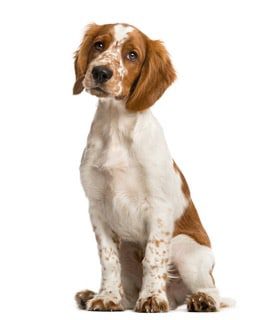
The Welsh Springer Spaniel is an undeniably majestic breed of dog that originated in South Wales in the late 19th century. Originally used as a hunting companion, it was admired by Victorian royalty because of its excellent noses and flushing abilities. It is a medium sized breed with a light, lean frame and an overall compact build. Its coat consists of medium length, soft feathers that are colored with varying shades of chestnut. They also have distinct white markings on their faces, chests and their bottoms.
Its eyes are almond shaped, dark in color, and alert in expression. Its ears are long, feathered and hang close to the head. Its muzzle is square and deep, and its nose has a slightly bulbous form. Common variations of the Welsh Springer Spaniel include red and white, and black and white. To make the Welsh Springer Spaniel truly unique, is its singular focus and absolute commitment to its family. This breed is also a particularly fast learner and an excellent watchdog. They are distinguished from other spaniel breeds by their longer legs, level topline, and their white coat markings.
The Welsh Springer Spaniel is an eager-to-please companion breed known for its amicable and gentle temperament. Intelligent and playful, these affectionate dogs are easy to train and highly tolerant of both children and other pets. Early socialization and training is essential for the Welsh Springer Spaniel in order to ensure proper growth and development of a well-rounded dog. Although they can easily live indoors, these dogs have a good amount of energy and need regular physical activity to stay in shape. This includes daily walks, jogs, or play sessions in a fenced yard. Welsh Springer Spaniels form strong bonds with their owners and are relatively quiet, making them great indoor companions that won’t disturb the peace.
The Welsh Springer Spaniel is a lively, working breed dog with a cheerful disposition. This breed is loyal, affectionate and easy to train. A healthy diet has an important role in maintaining their well-being. A diet rich in whole proteins, healthy fats, complex carbohydrates, vitamins and minerals is important for providing them the necessary energy for their daily activities. Proper digestion of food and nutrients absorption are also ensured by consuming foods that are appropriate for the breed.
Furthermore, responsible owners should be aware of the potential health risks of overfeeding and remember that exercise is also an essential part of maintaining their health. If you own a Welsh Springer Spaniel, then check out Way Canina for more detailed information about their nutritional requirements and feeding guidelines. Way Canina will help you find the foods that are safe and beneficial for your Welsh Springer Spaniel. The knowledge and careful consideration for their feeding habits is essential in ensuring a long and healthy life for your Welsh Springer Spaniel.
They are at risk for hip dysplasia and ear infections, so regular veterinary check-ups and preventive care are essential. Vaccinations help to protect them from contagious illnesses. They need to be groomed regularly with brushing, bathing, and ear cleaning to stay healthy and good-looking. Proper nutrition is also important, with a balanced diet that should be monitored and portion controlled to help prevent obesity. Regular exercise is also essential for their overall wellbeing.
The Welsh Springer Spaniel is a lively and hardy breed with a typical lifespan of 12–14 years. With proper care and healthcare, Welsh Springer Spaniels can be expect to have long, healthy, and happy lives.
Are you considering getting a Welsh Springer Spaniel? Be sure to consider the responsibilities, pros, and cons of owning this breed. We have many blog posts and articles on Way Canina that compare different breeds and provide additional information about Dog’s lifestyle and wellbeing. Be sure to check out our resources to better inform your decision.